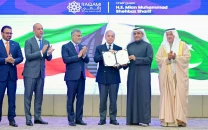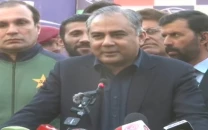Pakistan-Iran economic dialogue: Trade barriers dominate first day of talks
Tehran wants facilitation of banks; Islamabad wants removal of tariffs.

Pakistan and Iran began talks on a 16-point agenda for economic cooperation on Wednesday, with Tehran asking for greater facilitation of the Iranian banking sector from Pakistan and Islamabad asking for the removal of trade barriers by Iran.
Iran’s Foreign Minister Ali Akbar Salehi urged Pakistan to “provide opportunities to Iran’s private sector and remove bottlenecks in the banking sector for realising true bilateral trade potential,” a reference to Iran’s requests in the past to set up branches of the state-owned Bank Melli in Pakistan, a proposal that sources in the finance ministry said was unlikely to be accepted by Islamabad since it would violate United Nations sanctions against the Iranian financial services sector.
Salehi was speaking at the inaugural session of the 18th Iran Pakistan Joint Economic Commission, where he is heading a 40-member delegation from Tehran. Finance Minister Abdul Hafeez Shaikh is leading the Pakistani team at the two-day meeting.
A finance ministry official said that while Pakistan would likely not allow Bank Melli to open branches, it would instead propose that Iran use the multilateral Asian Clearing Union platform for channelling the flow of financing to fund its global trade. However, one problem with the ACU is that it uses euros as its dominant currency, whereas Pakistani banks finance trade in US dollars. This problem, however, is not insurmountable, particularly with the use of currency forward contracts and swap agreements.
International banks currently do not provide any letters of credit – the primary global tool of transferring funds between two international trading parties – for any transfers of goods and services to and from Iran. This has caused most Iranian businesses to use cash and hawala (informal money transfers) to finance their trade activities, with both of these channels accounting for an estimated 97% of Iranian trade.
Both cash and hawala are seen as less efficient, less reliable, and less secure a mode of transferring large sums of money.
The finance minister, in his address during the session, said that Pakistan remains committed to the gas pipeline from Iran, though no mention was made of Iran’s reported offer to fund the Pakistani segment of the project.
Shaikh said that Islamabad places no barriers to Iranian businesses looking to invest in Pakistan. He, however, did imply that Pakistan’s tariffs and non-tariff barriers to trade were considerably lower than Iran, calling for a ‘comprehensive review’ of trade policy between the two countries.
Pakistan’s trade with Iran is heavily tilted in Iran’s favour, with Iranian exports accounting for $1.2 billion of the $1.4 billion in trade between the two countries last year. According to Pakistan’s position paper, issued for the meeting, about 85% of Pakistan’s exports to Iran consist of rice and fruits, with most avenues of diversification minimised due to Iranian trade restrictions.
The paper also cites excessive intervention by the Iranian state in commercial activity, accounting for 80% of all of the country’s trade, which in turn, the government of Pakistan feels, denies Pakistani companies equal opportunities. Shaikh pushed Iran to facilitate interactions of the private sector. In absence of private sector, he said, “we are meeting like two managers without players.”
To promote trade, Shaikh proposed expanding the preferential trade agreement between the two countries and seeking mechanisms to formalise the ‘informal’ trade – a polite way of saying smuggling – which is estimated at between $1 billion and $2 billion.
Pakistan also urged Iran to implement the International Road Transportation of Passengers and Goods agreement, signed between the two nations at the last JEC meeting. Islamabad has ratified the agreement, though Iran has yet to do so.
The treaty would provide access to Pakistani trucks to Turkey, Central Asia and Russia via Iran.
Among other items on the JEC’s agenda was the proposal to allow Iran’s Khodro Company to set up an automobile manufacturing unit in Pakistan and the import of 1,100 megawatts of electricity by Pakistan from Iran.
Both countries would also look into transit of Iranian goods to India.
Published in The Express Tribune, September 8th, 2011.



















COMMENTS
Comments are moderated and generally will be posted if they are on-topic and not abusive.
For more information, please see our Comments FAQ